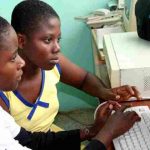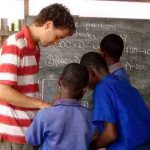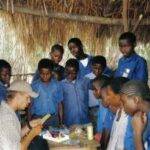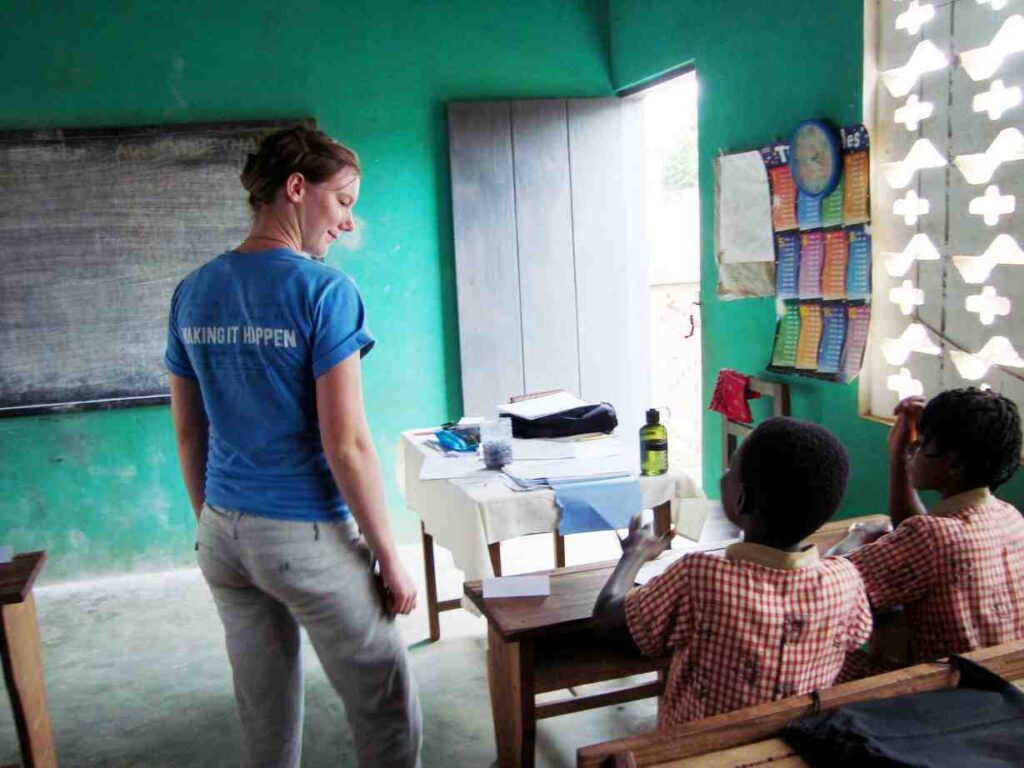- The program
- The schools
- The accommodations
- The feeding
- Entertainment and sight-seeing
- Volunteers’ safety
- Minimum qualification required
- Rough estimate of total cost involved
- Apply for this program
- Next steps — after you have been accepted
- Other relevant facts about the program
- Submit a question
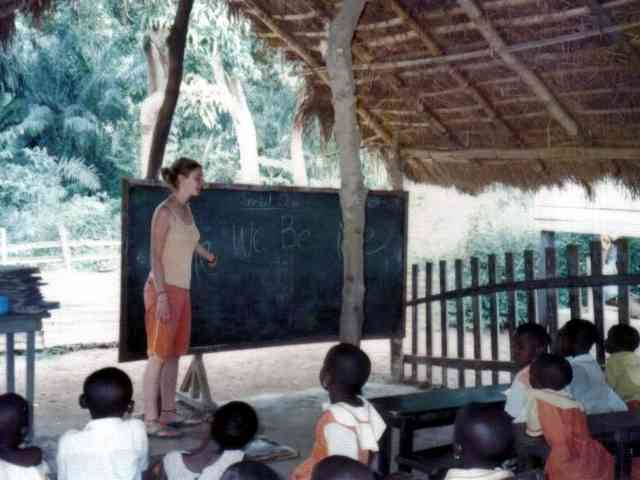
The program
The Citizen Education curriculum is designed to help Primaries 4-6 pupils to acquire the following:
- Commitment: determination to contribute to national development
- Tolerance: willingness to respect the views of others
- Patriotism: readiness to defend the nation
- Flexibility in ideas: willingness to change opinion in the face of more plausible evidence
- Respect for evidence: willingness to collect and use data on one’s investigation, and also have respect for data collected by others
- Reflection: the habit of critically reviewing ways in which an investigation or observation has been carried out to see possible faults and other ways in which the investigation or observation can be improved upon
- Comportment: conforming to acceptable societal norms
- Co-operation: the ability to work effectively with others
- Responsibility: the ability to act independently and make decisions; morally accountable for one’s action; capable of rational conduct
- Environmental Awareness: being conscious of one’s physical and socio-economic surroundings
- Respect for the Rule of Law: obeying the rules and regulations of the land
You can choose to teach the subject to any one (or more) of three different classes (or ages)
- Primary class 4 (mean age of 9 years). Read excerpts of the curriculum
- Primary class 5 (mean age of 10 years). Read excerpts of the curriculum
- Primary class 6 (mean age of 11 years). Read excerpts of the curriculum
Back to top
PRIMARY 4 CITIZENSHIP EDUCATION – Curriculum excerpts
At the end of the unit, the pupil should be able to: Identify his/her individuality, Identify his/her strengths (explain how individuals can improve on their strengths and talents), Explain the importance of inter-personal relationships, Demonstrate skills for sustaining good inter-personal relationships, Explain what is meant by ‘values’, Demonstrate how societal values guide her/his decisions and actions, Explain citizenship and community, Analyze critically issues in given situations, Make reasonable decisions in given situations, Explain the term ‘Constitution’, Explain how the Constitution is used to govern, Illustrate his/her role in sustaining the constitution, Explain ‘Human Rights’, Identify the fundamental human rights and freedoms of the individual, Describe ways in which the rights of the individual can be abused, Explain the need to respect the rights of others, Demonstrate ways of asserting his/her rights, Describe ways of claiming his/her rights… (A more detailed curriculum will be provided to you — after you have applied and confirmed your participation in the program) Top
PRIMARY 5 CITIZENSHIP EDUCATION – Curriculum excerpts
At the end of the unit, the pupil should be able to: Explain the term ‘Education’, Explain the value o education, Explain the importance of work, Analyze the relationship between education and work, Explain ‘Peer Group’, Describe the benefits of belonging to peer groups, Describe the dangers of belonging to peer groups, Demonstrate skills for dealing with peer pressure, Identify ways by which our lives are endangered in the home and community, Illustrate various ways of ensuring safety and safeguarding our health in the community, Identify some positive attitudes necessary for nation building, Identify some responsibilities of citizens towards nation building, Explain why citizens should perform their civic responsibilities, Differentiate between democracy and autocracy, Identify the features of democratic governance… (A more detailed curriculum will be provided to you — after you have applied and confirmed your participation in the program) Top
PRIMARY 6 CITIZENSHIP EDUCATION – Curriculum excerpts
At the end of the unit, the pupil should be able to: Explain who young people are, Identify the changes that occur during adolescence, Explain problems associated with adolescence, Explain how to manage the problems that occur during adolescence, Explain how to maintain personal hygiene, Explain how adolescent problems affect the nation, Explain what she/he wants to achieve in life, Explain how to prepare her/himself in order to accomplish his/her aspirations in life, Identify various skills necessary for later life, Explain the environment and sustainable use of resources, Examine human activities which destroy the environment, Identify practices that promote sustainable use of the environment, Explain ‘Domestic Violence’ and ‘Conflict’, Identify sources of conflict in his/her family, Analyze the effects of domestic violence and conflict on the family, Demonstrate skills for resolving conflict in the family, Explain the importance of peace-building in the community, Explain ways of preventing conflict in the community, Suggest peaceful solutions to conflicts, Demonstrate attitudes that promote peace in the community… (A more detailed curriculum will be provided to you — after you have applied and confirmed your participation in the program) Top
The schools
VIGS GHANA partner schools are located in many villages, towns and cities in the coastal belt. From Sega in the east through Prampram, Aburi, Tema, Bawjiasi, Accra and all the way to Twifu-Mampong and Takoradi in the west. We also have partner schools in the middle parts of Ghana (Kumasi).
Back to top
The accommodations
Most of the accommodation is with carefully-selected host-families, with a couple of dedicated volunteers’ apartments. You would be placed in the same home with another volunteer — except you specifically state that you prefer to be placed alone. Volunteers coming as a pair or couple will not be placed with other volunteers in the same bedroom. Volunteer(s) have their separate room – with a lock and key. There are two beds in the volunteers’ room; each with a mattress and in most cases a table and chair. It is advisable to bring along a mosquito net and a spare bed sheet. Many homes have a shower and flush toilet. In others you would have to manage with a bucket of water and a pit toilet – more likely in smaller towns and villages. Laundry is usually done with a couple of buckets.
Back to top
The feeding
You will be served three meals daily. Breakfast is usually tea/ coffee/ oats or corn porridge and bread with jam/ butter/ egg omelet. Lunch could be plantain or rice or yam with vegetable stew or similar. Dinner could be rice, yam, pasta or plantain with vegetable sauce or stew or soup. For dessert you’d be served an orange or pineapple.
Back to top
Entertainment and sight-seeing
Weekends are free days. You may choose to travel out of town to see the many interesting sights and sounds in other parts of Ghana or hang out with your fellow volunteer(s) and/or locals in the neighbourhood. VIGS-GHANA frequently puts together sight-seeing trips: as a volunteer on one of our programs, you’ll first be given the option to sign-on to our tours. The remaining slots will be offered to the general public. Back to top
Volunteers’ safety
Your safety is of paramount importance to VIGS GHANA. As such we give you all the relevant safety tips, plus we place you only in places where good medical services are within easy reach. In addition, we’ll give you a smart phone – so you can call or text or email or Whatsapp the in-country supervisors whenever the need arises. Our in-country support staff are on call 24 hours a day, 7 days a week. Back to top
Minimum qualification required of volunteers for the program: Applicants for this program must have at least completed high school. Back to top
Rough estimate of total cost involved
- Flight to and from Ghana: US$600-1250 (Round-trip)
- Ghana visa: US$80-170
- Vaccinations: US$150-250
- Travel Insurance: US$70-320
- Miscellaneous personal items: US$300-900
- Personal Spending money whilst in Ghana: US$200 upwards
- VIGS GHANA Program fee: starts from US$450
So, a rough estimate of the total cost for a two-week program duration would be about US$1,870 – 3,560. Check the equivalent in your currency. Back to top
Next steps — after you have been accepted and given your Placement information
After you have been admitted to participate in the program, you would now have to execute the following:
- Book a flight. See our flight information page. The earlier you book and confirm your flight, the better.
- Go through the suggested checklist of things to do and bring and start getting (or packing) them
- Send us your flight itinerary
- 60-30 days before your departure date, you must start processing for your Ghanaian visa. VIGS GHANA will provide you with the needed references in Ghana — which are needed to obtain a Ghanaian visa.
Back to top
Other relevant facts about the program
- Minimum volunteering/internship duration: 1 week.
- Maximum duration: 6 months.
- Age range accepted: 18 – 75 years.
- We will send you a document on how to fund-raise for your trip – after you’ve confirmed your participation.
- We will meet you at the Airport in Accra (ACC) on your arrival day.
- We will give you a smart phone with internet and IDD (International Direct Dialing) capability on your arrival day.
- The average work day is 3-8 hours for this program.
- Saturdays and Sundays are free days.
- You can contact VIGS GHANA local staff on cell phones all the time — 24 hours a day — seven days a week.
- We can give you a Testimonial on successful completion of your volunteer or internship work.
- You can pay the program fee through any of the following methods:
- PayPal or debit/credit card.
- Cash installments (or full payment) upon arrival into Ghana.
